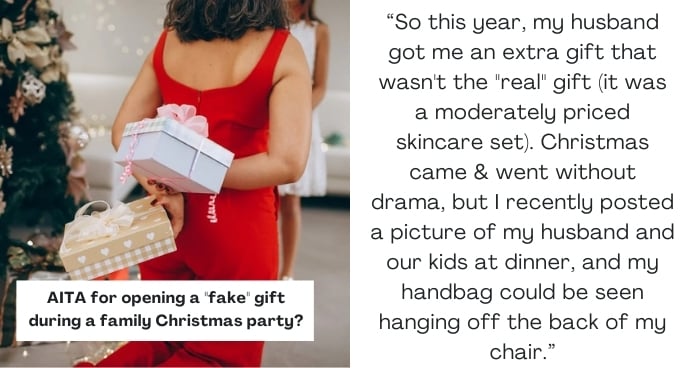Am I Wrong for Opening a Fake Gift at Christmas?

The OP (original poster) found themselves in a dilemma involving family dynamics and gift-giving traditions. During their family’s annual Christmas gathering, where all gifts are opened together, OP chose to open a “placeholder” gift—a modest skincare set—instead of the expensive designer handbag their husband had saved up to buy. Knowing that the bag would likely provoke envy or judgment from their siblings and parents, OP wanted to keep the moment special and free of criticism.
Later, a photo on social media revealed the designer bag, leading to backlash from their family. Some relatives were upset that OP withheld the real gift from the shared celebration, while others criticized the handbag’s cost. Their siblings accused them of being deceptive and “thinking they’re better” than the rest of the family. OP now feels conflicted, questioning whether their choice to protect a meaningful moment was inconsiderate or justified.
Read for more info Reddit

Image credits: Nicole Michalou (not the actual photo)


Many families have unspoken rules or traditions about what is considered appropriate for shared celebrations. OP’s decision to “withhold” the real gift may have inadvertently disrupted those expectations. However, it also highlights a broader issue: how financial disparities or personal preferences within families can lead to feelings of jealousy, competition, or even resentment. Studies on family dynamics suggest that these tensions often arise when material gifts are perceived as signals of status or favoritism (Otnes & Beltramini, Gift-Giving: A Research Anthology, 2002).

OP’s decision reflects a desire to preserve a private, intimate moment between themselves and their husband. This aligns with modern views on the importance of setting personal boundaries within family traditions. Sociologist Judith Martin has written about the pressure to conform during family gatherings, noting that maintaining individuality often triggers accusations of selfishness—even when no harm is intended.


Image credits: Helena Lopes (not the actual photo)

Posting the handbag online inadvertently exposed the secret, sparking family conflict. Social media often serves as a flashpoint for these types of misunderstandings, where glimpses of someone’s life can be misinterpreted as boasting. Psychologists have noted that social comparison theory (Festinger, 1954) comes into play here: when individuals feel they lack what others have, they may project negative emotions onto the perceived “offender.”

